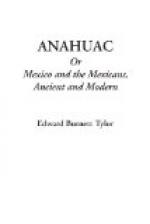On the morning of the third day of our voyage we reached Sisal, and as soon as the captain would let us we went ashore, in a canoe that was like a flat wooden box. This said captain was a Catalan, and a surly fellow, and did not take the trouble to disguise the utter contempt he felt for our inquisitive ways, which he seemed quite to take pleasure in thwarting. It was the only place we were to see in Yucatan, a country whose name is associated with ideas of tropical fruits, where you must cut your forest-path with a machete, and of vast ruins of deserted temples and cities, covered up with a mass of dense vegetation. But here there was nothing of this kind. Sisal is a miserable little town, standing on the shore, with a great salt-marsh behind it. It has a sort of little jetty, which constitutes its claim to the title of port; and two or three small merchant-vessels were lying there, taking in cargoes of logwood (the staple product of the district), mahogany, hides, and deerskins. The sight of these latter surprised us; but we found on enquiry that numbers of deer as well as horned cattle inhabit the thinly-peopled districts round the shores of the Mexican Gulf, and flourish in spite of the burning climate, except when a year of drought comes, which kills them off by thousands.
One possible article of export we examined as closely as opportunity would allow, namely, the Indian inhabitants. There they are, in every respect the right article for trade:—brown-skinned, incapable of defending themselves, strong, healthy, and industrious; and the creeks and mangrove-swamps of Cuba only three days’ sail off. The plantations and mines that want one hundred thousand men to bring them into full work, and swallow aborigines, Chinese, and negroes indifferently—anything that has a dark skin, and can be made to work—would take these Yucatecos in any quantity, and pay well for them. And once on a sugar-estate or down a mine, when their sham registers are regularly made out, and the Governor has had his ounce of gold apiece for passing them, and his subordinates their respective rights, who shall get them out again, or even find them?
This idea struck us as we sat looking at the Indians hard at work, loading and unloading; and finding an intelligent Spaniard, we fell to talking with him. Indians had been carried off to Cuba, he said, but very few, none since 1854, when two Englishmen came to the coast with a schooner on pretence of trading, and succeeded in getting clear off with a cargo of seventy-two natives on board. But being caught in a heavy gale of wind, they put in for safety—of all places in the world—into the British part of Belize. There some one found out what their cargo consisted of, the vessel was seized, the Indians sent back, and the two adventurers condemned to hard labour, one for four years, the other for two and a half. In a place where the fatigue and exposure of drill and mounting guard is death to a European soldier, this was most likely a way of inflicting capital punishment, slow, but pretty sure.[2]




